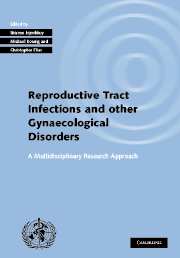 Investigating Reproductive Tract Infections and Other Gynaecological Disorders
Investigating Reproductive Tract Infections and Other Gynaecological Disorders Published online by Cambridge University Press: 07 December 2009
What can we learn from research on gynaecological infections and other disorders that will be most useful to sexual and reproductive health programmes and policies? In this final chapter we consider how the research methods discussed in the preceding chapters can be linked to the informational requirements of educators, service providers, policy makers, and other reproductive health advocates and practitioners. The purpose is to encourage researchers to think ahead about what planners will need to know if they are to design appropriate interventions. The chapter is organized around a series of questions addressed to the research process itself. It begins with the most basic question of all: What do we need to know about reproductive tract infections and related gynaecological problems, and why do we need to know it?
Framing the question: what do we need to know, and why?
The notion of ‘framing the question’ refers to how the fundamental purpose of the research is defined. Under whose auspices is it being conducted, and what is its justification? Is it intended for the advance of basic epidemiological or demographic knowledge, such as documenting the prevalence of particular diseases in a particular population that has not yet been studied? Is it to compare methods for collecting health-related and background information, such as self-reports, clinical and laboratory analyses, in-depth interviews, surveys, focus groups? Is it to establish correlations that could lead to the identification of causal factors? Is it to test specific hypotheses, supply deep descriptions, assess attitudes and practices, or measure trends and variations?
To save this book to your Kindle, first ensure no-reply@cambridge.org is added to your Approved Personal Document E-mail List under your Personal Document Settings on the Manage Your Content and Devices page of your Amazon account. Then enter the ‘name’ part of your Kindle email address below. Find out more about saving to your Kindle.
Note you can select to save to either the @free.kindle.com or @kindle.com variations. ‘@free.kindle.com’ emails are free but can only be saved to your device when it is connected to wi-fi. ‘@kindle.com’ emails can be delivered even when you are not connected to wi-fi, but note that service fees apply.
Find out more about the Kindle Personal Document Service.
To save content items to your account, please confirm that you agree to abide by our usage policies. If this is the first time you use this feature, you will be asked to authorise Cambridge Core to connect with your account. Find out more about saving content to Dropbox.
To save content items to your account, please confirm that you agree to abide by our usage policies. If this is the first time you use this feature, you will be asked to authorise Cambridge Core to connect with your account. Find out more about saving content to Google Drive.